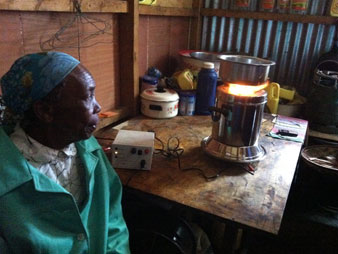Mitigation and Awareness
ABC programme has been commissioned mitigation programme in collaboration with Center for Clouds, Chemistry and Climate (C4) of Scripps Institution of Oceanography (SIO), University of California, San Diego (UCSD), USA; The Energy Resources Institute (TERI), New Delhi, India; and several other institutions.
Mitigation Programme mainly focusing on emission reduction of ABCs from biofuels used for the cooking, lightning, and domestic heating in Asia and Africa. This initiative is named as the
Project Surya. Project Surya is working toward developing the knowledge concerning mitigation measures for solid biomass uses in the residential sector. It aims to test and demonstrate the clean technology interventions which will provide sustainable, pro-environment, pro-poverty, pro-health, pro-women, and politically and socially acceptable alternatives for polluting traditional cooking stoves and kerosene lamps.
 Project Surya ssuccessfully implemented a pilot phase in a rural village of 485 households in Indo-Gangetic Plan of India to field test the clean cooking technology (i.e. improved cookstove) which is a pro-environment, pro-poverty, pro-health, pro-women, and politically and socially acceptable alternatives for polluting traditional cooking stoves and kerosene lamps.
Based on the success in India, Project Surya has also been replicated in a Kenyan village.
Project Surya ssuccessfully implemented a pilot phase in a rural village of 485 households in Indo-Gangetic Plan of India to field test the clean cooking technology (i.e. improved cookstove) which is a pro-environment, pro-poverty, pro-health, pro-women, and politically and socially acceptable alternatives for polluting traditional cooking stoves and kerosene lamps.
Based on the success in India, Project Surya has also been replicated in a Kenyan village.
Major highlights of the Pilot Phase includes:
Economic benefits: Customization and local fabrication of cleaner technologies reduces the cost of the cookstove technology. For example, the price of cleaner cooking stove reduces from US$120 per unit to US$ 40 per unit, which is affordable to poor rural population. In addition, the cost of purchasing biomass for cooking is also reduced by half. Similarly, the cost of purchasing kerosene is also to reduces as the kerosene lamp was replaced by the cleaner lighting system.
Technology improvements: The project tested, and demonstrated available cleaner technologies for the reduction of emissions of ABCs or short-lived climate pollutants (SLCPs). It is expected that the new technologies will facilitate adoption of climate friendly life styles in the developing countries
Social and health benefits: Households in the project village traditionally cook in stoves using locally available biomass. Introduction of improved stoves to these families have three immediate benefits: (1) reduction of black carbon by 50 to 70 percent have significantly improved the kitchen air quality, which is expected to reduce the respiratory diseases in women and children who spend most of their cooking time sitting next to mud cook stove; (2) drudgery in collecting biomass fuel like wood-chips have reduced as the improved stoves require 50 percent less biomass fuel than the traditional stoves; and (3) efficient cooking stoves reduced cooking time, and therefore, women will have more time to engage in productive activities, acquire new skills, fulfill other domestic responsibilities, or simply rest.
Contributions to climatic benefits at the regional and global level: Improved cleaner technologies reduced emissions of ABCs or short-lived pollutants from biomass burning during cooking in the Surya village. For example, cleaner cookers reduced black carbon emission by 50 to 70 percent compare to the traditional mud-stoves. This will help in climate change mitigation efforts at the regional and global levels.
With remarkable success in pilot studies of Project Surya in India and Kenya, a new initiative have been started which named as the Carbon Credit Pilot Project (C2P2) in India. The C2P2 aims to provide financial award to the women who use improved cookstove, based on the carbon credit market, for avoiding emissions of black carbon, ozone and other harmful air pollutants equivalent to CO2 emissions in terms of climate forcing.
National initiatives to reduce emissions of ABCs will gain strength from further international assessments and commitments, and vice versa. Such initiatives are instrumental for achieving desired progress. The Secretariat provides intergovernmental liaison for facilitating policy-relevant cooperation and decision-making with a view to supporting optimal design and implementation of mitigation measures based on technical and scientific findings.
